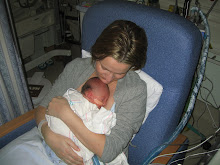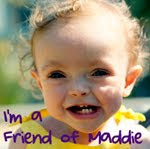Last weekend, we were at a park, and for the first time ever, my girl was moving herself around the play structure independently. Yes, it was by butt scootching, but it was . . . independent mobility. And, as I watched her, my heart felt so, so full. (It was a weekend of many, many amazing moments and there's more on that to come).
In that moment, she was just another three-year-old little girl, excited to be at the playground, moving as fast as she could toward her next thrill. As I watched her move, and watched her go down the slides all.by.herself, I thought, "This day is all about the cans. Look how far we've come!" I was, of course, completely aware that butt scootching isn't the "typical" way of getting around on a play structure, but in that moment, it didn't matter. I was soaring. She was doing it.
Then, we made our way over to a part of the play structure where two other little girls were playing, and an older girl asked me, "can she walk?" I took a breath, paused, and answered, "not by herself yet," and she said, "well how old is she?" and I said, "she's three." As a mom to a kiddo with special needs, I KNOW these questions will come, and everytime, I have a choice ... let it stop me in my tracks, or choose to make it a teachable moment. I could have explained how Sam's body just works a little differently (as I have before to an inquisitive little guy at the pool, who immediately said, "oh okay," and went right back to playing with Sam, though with a different gentleness than he had previously, leaving an impression on my heart forever), but I didn't feel like going into it. So, I gave her my simplest, shortest answers in a "just leave us alone" tone, and we kept playing.
And suddenly, I knew that that other little girl had just seen the differences. She'd seen the things Sam did differently, and not the ways they were the same. That, just like other three-year-olds, Sam was ecstatic to be at the playground, loved the slides, wanted to be near the other kids, giggled at her dada's silly jokes, squealed with glee as she went high in the swings and fast down the slide. Just like other kids.
But that wasn't what the other girl had seen.
And tonight, again, as I helped my girl figure out how to push her baby doll in a toy stroller while moving in her gait trainer, I was struck by the "cans." The things that make her just like other kids. And when I asked to take a picture and she made her best silly face, my heart soared because again . . . she's the same.
But yet, I wondered how another, outside observer would see it. Would they just see the big wheels? Would they just see the bulky black gait trainer?
Helping my girl navigate this world in her way, different as it may be, and helping others see the way she is just like them, helping her show the world who she is . . . the ways that she is the same . . . feels like a tall order sometimes, but as I watched her tonight, I felt so hopeful, optimistic, and so, so happy. The possibilities are endless.
Friday, July 13, 2012
Subscribe to:
Post Comments (Atom)



2 comments:
My friend's son Luke has a rare gentic disorder. His arms/knees are always in a slightly bent position and he can't lift his arms over his head. A little boy at a company picnic asked me why he couldn't and I just said "because he can't - just like you can't see well without your glasses" and he got this "AH-HA" look on his face and went right back to the business of playing.
Sometimes you have to point out the differences in each of us or those we love so it hits home - that differences are all around us; that we all have them (some just aren't as obvious) and it seems to make people more sensitive/welcoming to them when they realize that in our differences we really are SO THE SAME.
We're all disabled in so many ways. Dyslexia, hearing aids, glasses, walking canes, braces, Hyperactivity, etc., etc., etc.
It's not too hard to find a difference/disability in any child (or their sibling, parent, grandparent, etc.) and point it out as a manner of making the child aware of their own on a very personal level to them. Goes a long way to illustrate the point.
Your post made my heart soar and ache at the same time.
When I was really little, I met a boy at the pool with a severe intellectual disability. When I asked my mother about him, she said that although he is different, he has the same feelings as you and I do. That was my "ah-ha" moment. I never imagined I'd have a child with disabilities all these years later...
Post a Comment